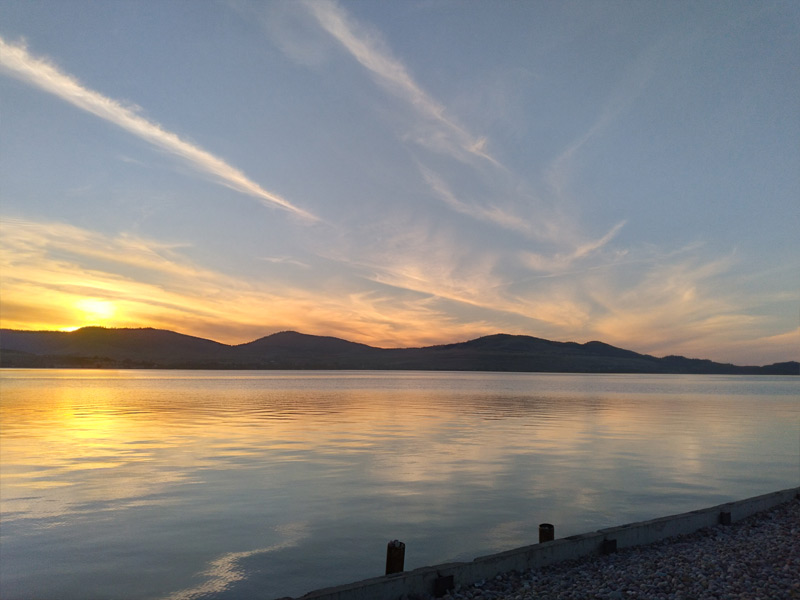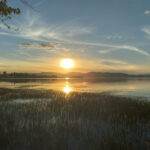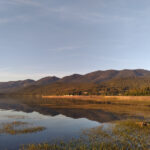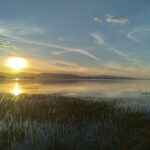Welcome to the Flathead Indian Reservation.
Let’s take a moment to consider the history that took place to allow you to enjoy all of the recreational and hiking opportunities Flathead Lake has to offer.
The southern half of Montana’s Flathead Lake resides on the Flathead Indian Reservation. This is Indian Country. The Hellgate Treaty of 1855 set this land aside for the Salish, Kootenai and Pend Oreille Tribes.
Charlo, or Charlot, was the son of Victor, and his successor as chief of the Salish bands. The Treaty of 1855, negotiated by Isaac Stevens, had guaranteed that Victor and his people could stay in the Bitterroot Valley. In 1872, however, President U.S. Grant ordered the Salish, then led by Chief Charlo, to move north to the Flathead Reservation. Two sub-chiefs, Arlee and Joseph Nine Pipes, complied, but Charlo refused, and stayed resolutely, but “illegally,” on his native lands.
In 1876, the government of Montana Territory proposed a tax on Indians’ property. Charlo’s bitter but eloquent response resonates with his deep sadness and disillusionment.
Chief Charlo’s Answer
Since our forefathers first beheld [the white man], more than seven times ten winters have snowed and melted. Most of them like those snows have dissolved away. Their spirits went whither they came; his, they say, go there too. Do they meet and see us here? Can he blush before his Maker, or is he forever dead? Is his prayer his promise—a trust of the wind? Is it a sound without sense? Is it a thing whose life is a foul thing?…
What is he? Who sent him here? We were happy when he first came; since then we often saw him, always heard him and of him. We first thought he came from the light, but he comes like the dusk of the evening now, not like the dawn of the morning. He comes like a day that has passed, and night enters our future with him.…
Had Heaven’s Chief burnt him with some mark to refuse him, we might have refused him. No, we did not refuse him in his weakness; in his poverty we fed, we cherished him—yes, befriended him, and showed the fords and defiles of our lands. Yet we did think his face was concealed with hair, and that he often smiled like a rabbit in his own beard. A long-tailed, skulking thing, fond of flat lands, and soft grass and woods.
To confirm, his purpose; to make the trees and stones and his own people hear him, he whispers soldiers, lock houses and iron chains.…He, the cause of our ruin, is his own snake, which he says stole on his mother in her own country to lie to her. He says his story is that man was rejected and cast off. Why did we not reject him forever? He says one of his virgins had a son nailed to death on two cross sticks to save him. Were all of them dead then when that young man died, we would be all safe now and our country our own. . . .
…His meanness ropes his charity, his avarice wives his envy, his race breeds to extort. Did he speak at all like a friend? . . .
He is cold, and stealth and envy are with him, and fit him as do his hands and feet. We owe him nothing; he owes us more than he will pay, yet he says there is a God.…
His laws never gave us a blade nor a tree, nor a duck, nor a grouse, nor a trout. No; like the wolverine that steals your cache, how often does he come? You know he comes as long as he lives, and takes more and more, and dirties what he leaves.”
In 1891, after 20 more years of impoverishment and near-starvation, Charlo agreed to move his band of 157 people to the Flathead Reservation. They walked the seventy-five miles from their ancestral homeland in the Bitterroot Valley to the Jocko Valley at the southern end of the reservation.
The Arlee Powwow Celebration.
To have the current information please visit their website: http://arleepowwow.com/
PO Box 163
Arlee, MT 59821
+1 406-529-5464
arleepowwow@cskt.org
http://arleepowwow.com/




